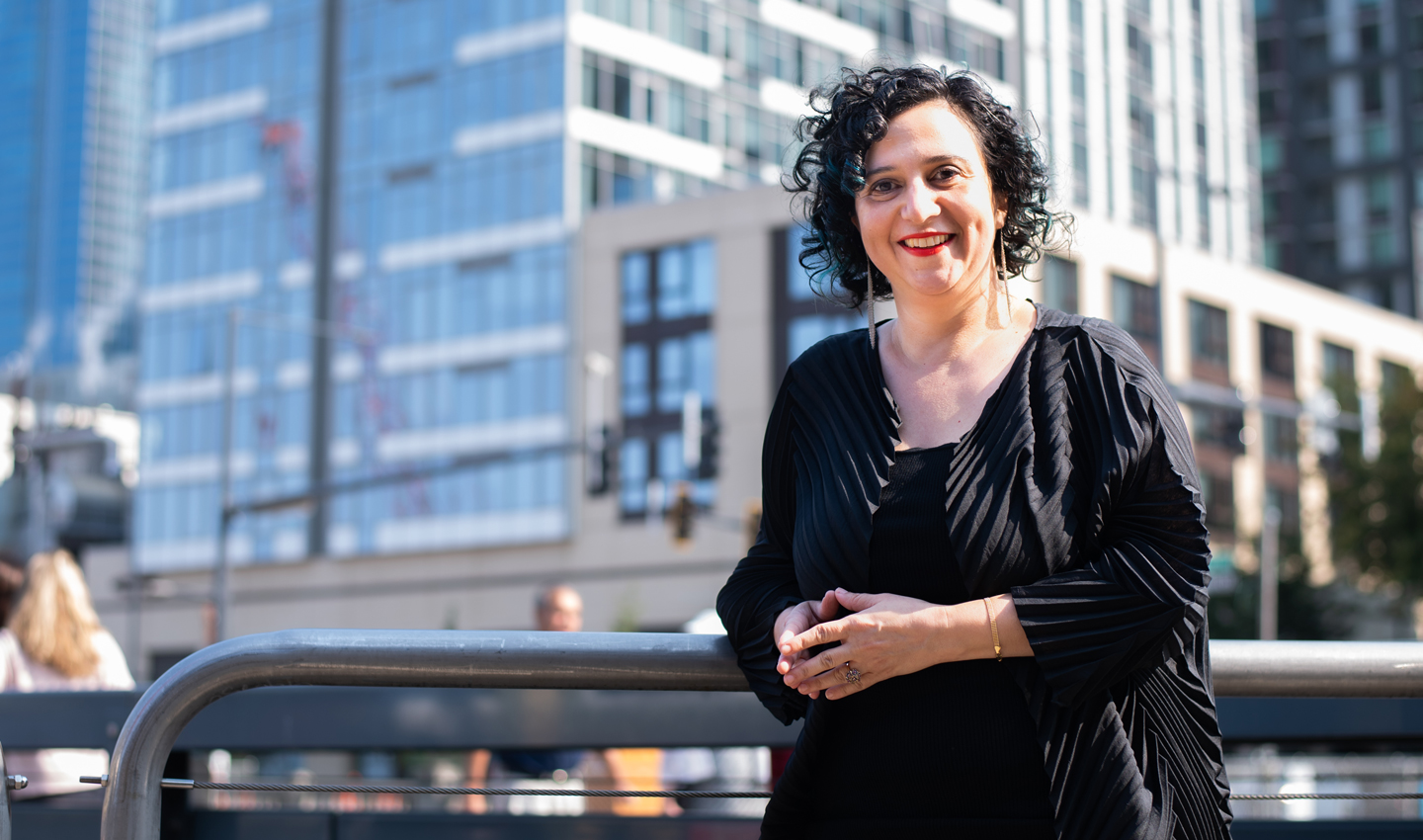Nassim Parvin uncovers hidden sexism, racism, ableism, homophobia and other social injustices in technology and product design — issues that surface as biases in self-tracking devices, for example, or in the assumptions embedded in the original AI-powered voice of Alexa: nice, white and utterly submissive.
“You can curse Alexa and she will ask you in a calm voice if she can help you more,” says the new iSchool associate professor, whose work is centered in feminist philosophy. “Kids growing up with such technology may internalize the notion that because Alexa is a female character, they have the liberty to interact with her in any manner they please.”
At the iSchool, she will be stepping into the role of associate dean for IDEAS (inclusion, diversity, equity, access and sovereignty), a 3-year-old initiative aimed at ensuring a campus free of discrimination, bias and microaggression. “I hope to build a model of how academic environments can be more inclusive, educating the next generation of students,” she says.
She’ll be taking over for Wanda Pratt, the inaugural associate dean for IDEAS, who welcomes Parvin’s extensive expertise in design justice. “Nassim will serve as a unifying force in the iSchool with her interdisciplinary research at the intersection of ethical and political philosophy, as well as the design of emerging technologies and algorithmic applications — all related to IDEAS,” says Pratt.
Parvin has been focused on social injustices since her childhood in Iran, where, at an early age, she watched as her parents burned their books for fear of being arrested. “All my life, I have been driven to think about what a democratic society looks like, what it means for people from different religions and backgrounds to live well together. Gender equality has been a big part of that thinking,” says Parvin, whose last name is adopted from the first name of her mother, a teacher who was forced to resign because of her democratic beliefs.
“She devoted her whole life to me and my sister, both now Ph.D.s. Adopting her name is both to honor her sacrifices and to prompt reflection on the longstanding tradition of using male names, typically associated with fathers and husbands, as a default.”
"We create these surveillance devices in the name of safety and those most harmed are people who have been historically excluded and marginalized in society."
Parvin intentionally defies stereotypical images of scholars and intellectuals. Her dark, curly hair is streaked with blue and green. She wears eye-catching deep red lipstick. “In the classroom last year, I shared an artwork centered around women’s lipstick. I noticed a few men laugh and whisper dismissively, indicating that it was insignificant and superficial. That gave me an opportunity to talk about the politics of self-expression; how in Iran women can be arrested for wearing lipstick. That’s a big deal.”
Parvin earned a B.A. in electrical engineering from the University of Tehran, the first time she’d been in a co-ed class. After moving to the United States, she earned a master’s in information design and technology at Georgia Tech and a Ph.D. in design from Carnegie Mellon University. She returned to Georgia Tech as an assistant professor and established the Design and Social Justice Studio, an interdisciplinary group of faculty and students who investigate and build products and services centered on social justice.
Her studio projects included the development of games and educational materials tailored to the challenging subject of quantum mechanics, which has historically presented obstacles for students with limited access to quality teaching and resources.
Such structural injustices have a way of hiding in plain sight, says the researcher. A step-tracking device built to able-bodied standards can leave differently abled users feeling physically inadequate. People who post guides to public transportation may not take into consideration varying literacy levels of users. Heavy surveillance in minority neighborhoods leads to racially skewed data on national crime.
“We create these surveillance devices in the name of safety and those most harmed are people who have been historically excluded and marginalized in society — people of color, people who dissent against their government, people who may not have money or a place to sleep at night,” she says.
Parvin is a widely published author and an editor of “Catalyst: Feminism, Theory, Technoscience,” an innovative journal in the field of feminist technoscience. Her current collaborative book project, titled: “Technocreep and the Politics of Things Not Seen,” probes the issue of surveillance and related concerns by engaging with a wide range of technologies that include smart homes, smart forests and smart dust.
Greater awareness of the political, ethical, philosophical and historical roots of problematic presuppositions is a critical first step toward more democratic design, she says. Another important step is making the creation of products and technologies more inclusive and representative. Parvin encourages participatory design practices that involve diverse users in the development of technologies that affect them.
“We need to ask who gets to design technology and what are the conversations that give rise to it,” she says.
A celebrated instructor who has been honored with multiple teaching awards, Parvin is looking forward to investigating these ethical questions in her classrooms at the iSchool. “It’s important to introduce the ideas early in students’ education,” she says. “It shapes the courses they will take and the questions they will ask going forward.”
iSchool dean Anind Dey describes Parvin’s work on a range of real-world problems as incredibly impactful. He is excited to see her in her new dual roles. ”Nassim is committed to dealing with all forms of social inequity. Her focus on creating a community where belongingness is centered will be a wonderful fit for our IDEAS work.”
